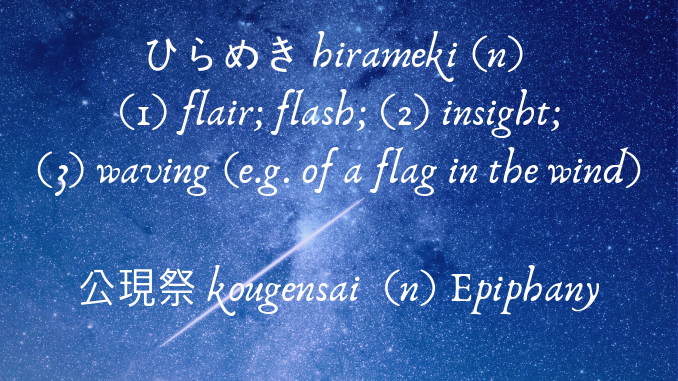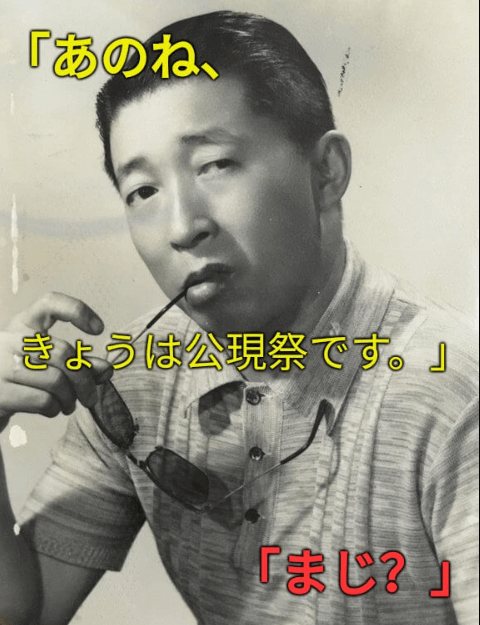
We are currently in the first week of Epiphany, the manifestation of Christ to the gentiles, more commonly known as the time when the Magi, or Three Wise Men (or Three Kings) follow a star from the Orient to Bethlehem where they find the Christ child.
Here in Japan very few people know anything about the Epiphany story. It makes a good topic for community centre classes around this time of year, especially as it tells of how people from the east, following the insights of their own traditions of astrology, discovered the incarnate Deity.
If you look up “epiphany” in an English-Japanese dictionary you will probably find two Japanese words:
- ひらめき – hirameki (n) (1) flair; flash; (2) insight; (3) waving (e.g. of a flag in the wind).
- 公現祭 【こうげんさい】- kougensai (n) Epiphany (Christian holiday).
Hirameki
The second definition of “hirameki” is closest to the general meaning of “epiphany” in English, a moment of insight. The insight typically occurs as a “flash” of inspiration.
However, “hirameki” also covers a meaning quite different from our “epiphany” – and yet it provides an interesting layer of meaning to the idea of “epiphany” in the fluttering of a flag in the wind.
Huineng’s Flag
Indeed, a flag-fluttering epiphany is the point of a Zen koan attributed to Huineng, the sixth Zen Patriarch:
Two monks were watching a flag fluttering in the wind.
One said, “The flag is moving.”
The other replied, “The wind is moving.”
The master said, “It’s neither the flag nor the wind but your mind that moves.”
The monks were astonied.
Kougensai
The technical word for the Christian feast of the Epiphany, however, is “kougensai,” which can be literally translated as “public appearance festival.”
As for the magi, they are referred to as “the three learned persons (or doctors) of the Orient” in Japanese:
東方の三博士 【とうほうのさんはくし】- touhou no san hakushi
Magi has also been translated as 賢者 【けんじゃ; けんしゃ】- kenja; kensha (n) wise man; wise woman; sage. See for example the Japanese translation of O’Henry’s “The Gift of the Magi”
“Magi” is the plural of “magus” from the Latin word for the Ancient Greek μάγος or mágos, which means “magician” and is said to have originated in Zoroatrian Persia.
The Japanese word for magician is 魔術師 【まじゅつし】- majutsushi (n) magician; conjurer. Majutsushi is the Japanese translation of the Magician card in the upper arcana of the tarot.
Magi Maji
The first two kana of the hiragana, まじ are pronounced “Maji” but the “ji” is modified by the small ゅ “yu” so the actual pronunciation is “maju” but the coincidence of “maji” and “magi” was too much for me to resist. So I made a meme if you know what I mean…
Keep in mind that in colloquial Japanese “maji” 【まじ】means “really” or “seriously”…

“Ano ne, (I say)
Kyou wa kougensai desu.” (Today is Ephiphany.)
“Maji?” (Really?)
Boom boom!
Very silly, but it made me laugh so much that I posted it on Facebook! But Facebook is not into that sort of epiphanic humour and it received zero likes. 🙂
